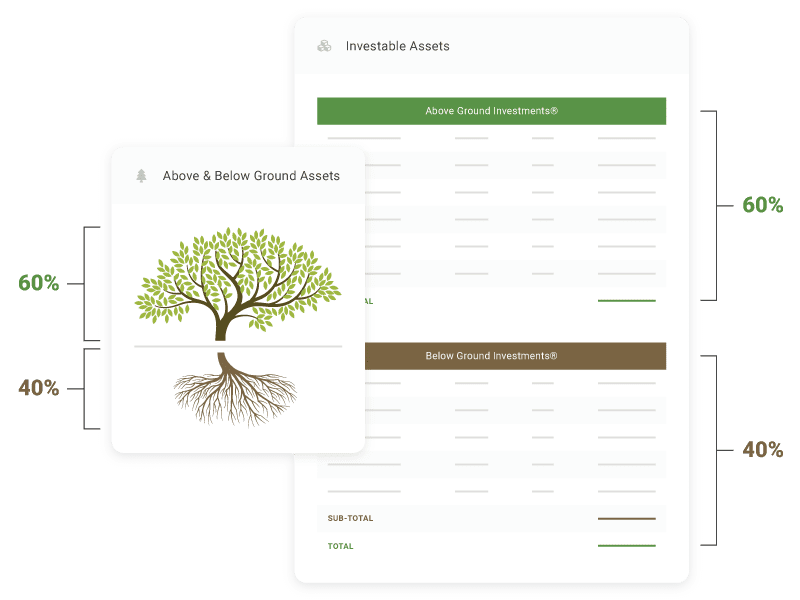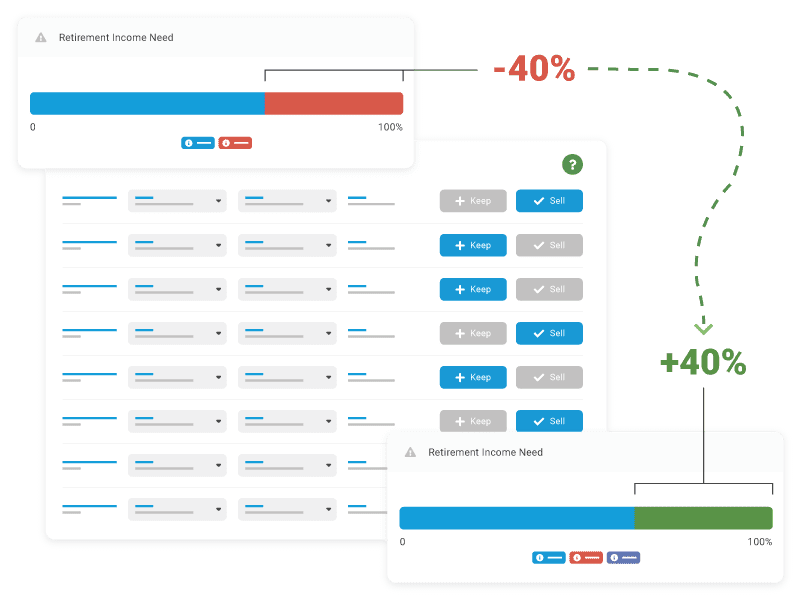There are many different types of insurance options available to retirees. While every insurance option can play an important role in your overall retirement plan, life insurance is perhaps one of the most common investments and can serve as an important part of any financial plan. It can assist a family upon the passing of a loved one by offering death benefit protection and by providing funds to cover a variety of expenses, from funeral costs to hospital bills. When it comes to life insurance coverage, there are two primary types: term life insurance and whole life insurance. While many people tend to confuse the two, there are important differences between them that should be understood before making a decision about which is right for you. In this article, we’ll take a look at the key distinctions between these two types of insurance so that you can make an informed decision.

Whole life insurance vs term life insurance
What is Term Life Insurance?
Term life insurance provides coverage for a set period of time—the “term”. In exchange for regular payments (premiums), the policyholder’s beneficiaries are entitled to receive a death benefit should the insured die during the term of the policy. The premiums for term life insurance are usually lower than those of whole-life policies because they cover only a specific length of time rather than an entire lifetime. However, because they provide coverage only during the specified period, they do not accumulate cash value over time as whole-life policies do.
3 Advantages of Term Life Insurance
Term life insurance can offer peace of mind while providing numerous financial benefits. Let’s examine some of the key advantages of this type of life insurance policy:
1- Affordability
Term life insurance premium payments tend to be more affordable than permanent life insurance policies because it does not come with any cash value or investment options as a permanent life insurance policy would. This means you can get more coverage for your money with a term life insurance policy, making it an ideal option for people on a budget who want to ensure their families are taken care of financially in the event of their passing.
2- Flexibility
Another perk of term life insurance is the flexibility that other types of life insurance cannot match. Individuals considering a term life insurance policy have the opportunity to choose from different terms ranging from 10 years to 30 years depending upon their needs and budget. A term life insurance policy can be selected often without the need for a medical exam and gives you the option to renew your policy at the end of each term. Thus giving you continuous coverage as long as you need it. Additionally, many insurers offer riders that can be added to your term life insurance policy for an additional cost. This can provide extra protection in case certain events occur during the term (such as disability).
3- Tax Benefits
Life insurance benefits are generally tax-exempt when the death benefit is paid out to beneficiaries. This can help ease the financial burden associated with such an event. Additionally, some employers offer group term life insurance policies as part of their benefits packages giving employees the opportunity to purchase additional coverage at discounted rates. These tax benefits may be especially attractive to business owners and those nearing retirement who want additional security but don’t have extra money to spend on premiums.

Do you know the disadvantages of term life insurance?
What are the 3 Disadvantages of Term Life Insurance?
While term life insurance can be a great option for some, there are drawbacks you need to be aware of before making your decision.
1- Limited Coverage Period
The biggest downside to a term life insurance plan is it expires at the end of its coverage period. This means if you have a 10-year policy, you will no longer have coverage after 10 years. If you pass away during this period, however, your beneficiaries will receive the guaranteed death benefit from your policy. Once the policy expires, there is no guarantee you can renew or extend coverage as rates may have increased or you may no longer qualify for coverage for medical reasons.
2- Premium Increases
Another disadvantage of term life insurance is how the premiums can increase over time. While premiums are initially calculated based on factors such as age and health history, they can increase over time due to inflation or other factors beyond your control. This means while your premium may start out low when you purchase a policy, it could increase significantly over time which may make it difficult to maintain coverage.
3- No Cash Value
Finally, unlike permanent life insurance policies, such as whole life or universal life insurance policies, term life does not accumulate cash value over time. This means there is no value associated with the policy if it isn’t used for its intended purpose i.e. providing financial protection in the event of death. This also means if you change your mind and decide not to keep the policy after all, you won’t get any money back as there is no built-up equity in a term life policy like there is with many permanent policies.
What is Whole Life Insurance?
Whole life insurance is a permanent life policy that remains in effect until you pass away. Unlike term policies, whole life policies offer permanent coverage and financial stability throughout your entire lifetime. They also can have tax-deferred cash values which increase over time as long as premiums are paid on time and in full. These funds can be used while you are still alive to supplement retirement income or pay for other expenses such as college tuition or medical bills.

whole life insurance has tax benefits
3 Advantages of Whole Life Insurance
Whole life insurance is an effective and reliable way to provide lifelong financial security for your family, and there are several key benefits associated with this type of insurance:
1- Cash Value Accumulation
One of the main advantages of whole life insurance is its ability to serve as a form of long-term savings and asset protection since it can accumulate cash value over time. This cash value can be used in different ways, depending on your policy and provider’s rules. In addition, the cash value can help offset any future premium increases or pay out dividends if your provider offers them.
2- Tax Benefits
Another advantage of whole life insurance is the tax benefits. Generally speaking, any money that goes into paying for your premiums is tax-deductible and will not count toward your taxable income each year. In addition, any money that comes out from withdrawals or loans from your policy will not be taxed unless you withdraw more than what has been paid in premiums into the policy. As always, it’s best to speak with your accountant or financial advisor regarding any questions you may have.
3- Death Benefit
The most obvious benefit of having a whole life insurance policy is its death benefit—the amount paid out when you pass away—which is usually tax-free and can help provide financial security for loved ones after you’re gone. The payout amount depends on how much coverage you had purchased and whether there were any riders attached to it (such as long-term care or disability).

Whole life has its disadvantages, do you know them?
3 Disadvantages of Whole Life Insurance
As with any financial decision, it’s important to understand both the pros and cons before you commit, just as with term life insurance, whole life insurance policies aren’t without their disadvantages.
1- Costs and Fees
Whole life insurance policies tend to be more expensive than other types of insurance such as term or universal policies. This is because premium payments include an investment component which can increase the cost significantly. There may also be additional fees associated with the policy such as administrative fees, surrender charges, and loan interest if you take out a loan against your policy’s cash value. Depending on the size of the policy, a medical exam may also be required. These costs can add up quickly and eat into any potential savings or investments you make through your policy.
2- Locked-in Investment Risk
Another disadvantage of whole life insurance is the limitation of options available for investing your funds within the policy. It is possible you may not have access to investments that meet your risk tolerance or return expectations. Additionally, if the insurer makes bad investments on behalf of its customers, it could ultimately lead to losses in your policy’s cash value balance.
3- Tax Implications
Finally, one of the biggest disadvantages to consider when considering whole life insurance is its tax implications. The funds within a whole life policy accumulate on a tax-deferred basis meaning any gains made on those funds will only be taxed when they are withdrawn from the account (unless they are taken out as part of a loan). However, when withdrawals do occur, they will typically be subject to income taxes unless they meet certain criteria set by the IRS. This means if you need access to those funds in retirement, you may end up paying more in taxes than you would with other types of investments.
Deciding What Life Insurance Coverage is Right for You
Deciding whether or not to go with a term or whole life insurance policy depends on what stage in life you currently find yourself. The kind of coverage you need now versus down the road when things may look very different financially speaking also plays a large role in your decision-making. If inexpensive, immediate coverage is more important than having access to cash value later down the line, then you may wish to go with a term policy. Alternatively, if having steady lifelong coverage that accumulates cash value over time is more important, then a whole life policy would be more suitable. Be sure your life insurance policy not only meets your short-term needs but your long-term needs as well. Doing this will help put your mind at ease and give your loved one’s peace of mind knowing their future is secured.

A financial advisor who sells insurance can help to answer your questions
2 Ways a Financial Advisor Can Help With Life Insurance Options
With the help of a financial advisor, choosing the right life insurance product can become simpler and more efficient.
1- Assessment of Your Current Financial Situation
The first step in determining which insurance policy is right for you is assessing your current situation. For many, this can start with a retirement evaluation. A financial advisor can go through all of your assets, income, expenses, and debt in order to have a comprehensive understanding of what you’ll need from an insurance policy.
2- Helping You Make Informed Decisions
When it comes to purchasing an insurance policy, there are many factors to consider such as coverage levels, premium amounts, deductibles, and other optional features that may be included in the policy. A financial advisor can help navigate these complexities and explain them in terms that make sense to you so you can know exactly what type of coverage you are getting for your money. They can also provide guidance on choosing between different providers and explain how different policies might work together within your overall wealth management plan.
Considering Term vs. Whole Life Insurance?
A life insurance policy can play an important part in any financial plan. Understanding the difference between term and whole life insurance is vital before deciding which one is best for you. Both term and whole life insurance policies are beneficial in different ways depending on the needs of each individual. They also both have their drawback. That’s why it’s important to consider all aspects before making a final decision about which type of policy works best for you.
If have questions about life insurance plans, the Kaizen Wealth Management team can help.



